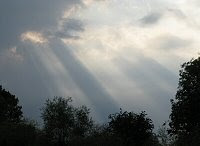 Sixty years later after painstaking cleaning and study, it emerged that the device was a mechanical analogue computer for predicting the movements of the sun and moon in the sky. Various replicas have been built based on the known features of the mechanism.
Sixty years later after painstaking cleaning and study, it emerged that the device was a mechanical analogue computer for predicting the movements of the sun and moon in the sky. Various replicas have been built based on the known features of the mechanism.The Antikythera mechanism makes it abundantly clear that the Greeks were advanced, not only in their scientific knowledge, but also in their mechanical technology. Reports from ancient writers like the Roman author, Cicero, describe mechanisms such as Antikythera. But until the corroded remains were recovered and studied these written accounts seemed fanciful. Surely the ancient world had nothing this advanced?
More recent studies have used high resolution X-ray tomography, and better reconstructions have become possible.
One of the later reconstructions can be seen working in the video below. If you view the video from You Tube you can switch to a higher resolution.
The X-ray tomography data has opened up a new window into the workings of the device. But it has also enabled historians to read a considerable amount of Greek text from the metal surfaces. This text consists partly of labels on the various scales and displays the mechanism used to present the positions of planets, calendar dates and so forth. The remainder of the text is a guide on how to use the device.
A great deal can be learned from the inscribed text. The names of the months varied from place to place in the ancient Greek world and this means we can determine its place of manufacture or intended use to be the central Mediterranean, not as originally supposed the eastern Aegean.
A longer and more technical video is presented on the Nature website (select the high resolution version and watch it in full-screen for the best view). There are also links to the Nature paper by Freeth, Jones, Steele, and Bitsakis, and a Nature news story (though there's a fee for the full text of these).
Wikipedia's article on the mechanism provides more detail for the average reader and has an excellent list of references, links, and suggested additional reading. One of the links is an article from New Scientist giving a good deal of background.
Links
- In search of lost time - Nature article, Nov 2006



